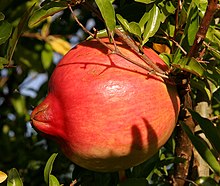Punica
| Punica Temporal range:
| |
|---|---|

| |
| Punica granatum | |
| Scientific classification | |
| Kingdom: | Plantae |
| Clade: | Tracheophytes |
| Clade: | Angiosperms |
| Clade: | Eudicots |
| Clade: | Rosids |
| Order: | Myrtales |
| Family: | Lythraceae |
| Subfamily: | Punicoideae (Horan.) Graham, Thorne & Reveal |
| Genus: | Punica L. |
| Species | |
|
See text | |
| Synonyms | |
|
Socotria G.M.Levin[1] | |
Punica is a small genus of fruit-bearing deciduous shrubs or small trees in the flowering plant family Lythraceae. The better known species is the pomegranate (Punica granatum). The other species, the Socotra pomegranate (Punica protopunica), is endemic to the island of Socotra. It differs in having pink (not red) flowers and smaller, less sweet fruit.
Although Punica was previously placed in its own family Punicaceae, recent phylogenetic studies have shown that it belongs in the family Lythraceae, and it is classified in that family by the Angiosperm Phylogeny Group.
The name is derived from the Latin word for the pomegranate, malum punicum, meaning "Carthaginian apple".[2]
The oldest fossils of the genus are from the Eocene of Europe, with the genus being widespread in Europe during the Miocene epoch.[3]
Extant species
| Image | Scientific name | Common Name | Distribution |
|---|---|---|---|
 |
Punica granatum L. | Pomegranate | Iran to northern India |
 |
Punica protopunica Balf. | Socotran pomegranate | island of Socotra (Yemen) |
-
Flowers of P. granatum
References
- ^ "Genus: Punica L." Germplasm Resources Information Network. United States Department of Agriculture. 1998-06-02. Retrieved 2012-12-09.
- ^ Quattrocchi, Umberto (2000). CRC World Dictionary of Plant Names. Vol. 3 M-Q. CRC Press. p. 2230. ISBN 978-0-8493-2677-6.
- ^ Graham, Shirley A. (March 2013). "Fossil Records in the Lythraceae". The Botanical Review. 79 (1): 48–145. Bibcode:2013BotRv..79...48G. doi:10.1007/s12229-012-9116-1. S2CID 17518452.
- Graham, Shirley A.; Thorne, F. Thorne & Reveal, James L. (May 1998). "Validation of subfamily names in Lythraceae". Taxon. 47 (2): 435–436. doi:10.2307/1223775. JSTOR 1223775.
- Graham S. A.; Hall J.; Sytsma K.; Shi S. (2005). "Phylogenetic analysis of the Lythraceae based on four gene regions and morphology". International Journal of Plant Sciences. 166 (6): 995–1017. doi:10.1086/432631. S2CID 37556600.
- Little S. A.; Stockey R. A. & Keating R. C. (2004). "Duabanga-like leaves from the Middle Eocene Princeton chert and comparative leaf histology of Lythraceae sensu lato". American Journal of Botany. 91 (7): 1126–1139. doi:10.3732/ajb.91.7.1126. PMID 21653468.

